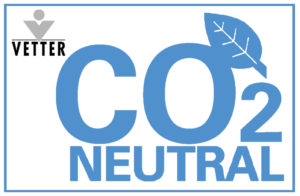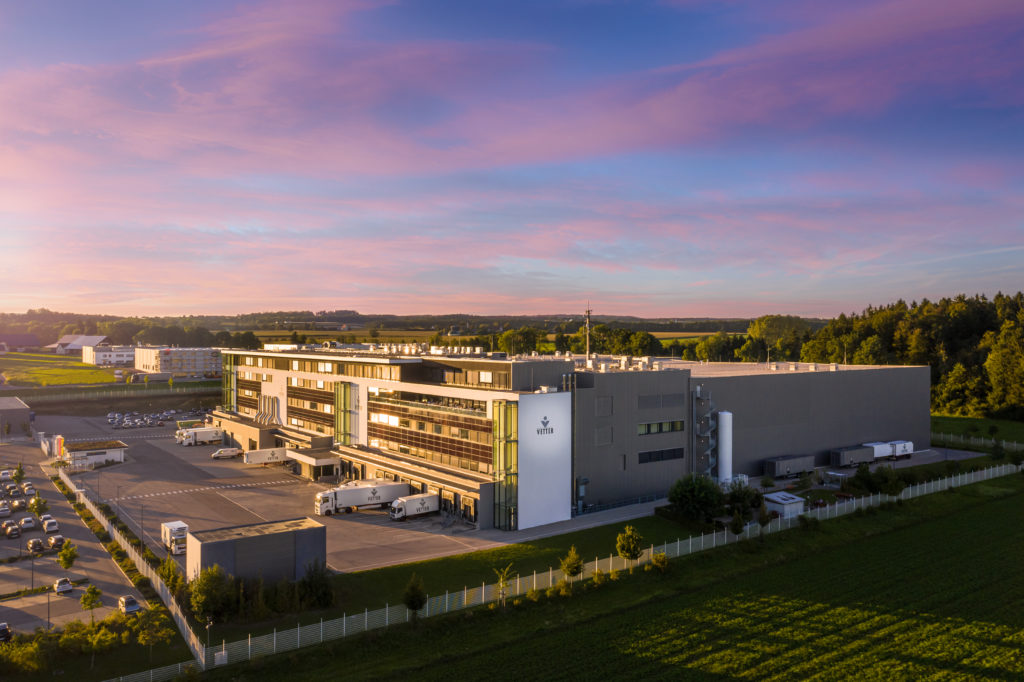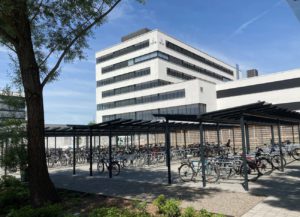Citation: Soelkner P, Otto T, “Strategies to Achieve Long-Term Sustainability”. ONdrugDelivery, Issue 126 (Oct/Nov 2021), pp 66–68.
Peter Soelkner and Thomas Otto discuss how the pharmaceutical service provider focuses on sustainability.
The history of Vetter started with a simple pharmacy in a late Gothic, half-timbered house in Ravensburg city centre in Germany, which is still there today and serves as a reminder of the first entrepreneurial steps taken by founder Helmut Vetter in the 1950s.
“Since 2014, all Vetter’s German sites have been operating with green power from hydroelectric plants.”
The pharmaceutical service provider produces injectable drugs for its customers in the pharmaceutical and biotech industries that are vital for patients around the world. Among them are medications for cancer, multiple sclerosis and rheumatoid arthritis, as well as treatments for rare diseases. Vetter employees 5,500 staff in Ravensburg and Langenargen in Germany, as well as at sites in Austria, the US and Asia.
The company has remained down-to-earth and is proud of its roots in the region, which have enabled it to achieve significant growth. Since its foundation, Vetter has consistently pursued its path as a family-owned business that focuses its activities on the well-being of patients and takes a long-term view. The topic of sustainability plays a central role for the organisation on many levels – it aims to improve the quality of life of millions of patients worldwide in a sustainable manner. At Vetter, responsibility towards both patients and society are inseparably linked.
COMMITMENT TO CLIMATE PROTECTION

Figure 1: All Vetter sites around the world are carbon dioxide neutral.
The understanding that global carbon dioxide emissions must be sharply reduced has continued to grow worldwide. Vetter recognised this need early on and has been using green technologies for many years, while also making continuous investments in climate protection. For example, since 2014, all Vetter’s German sites have been operating with green power from hydroelectric plants. The company reached another milestone last year when it achieved carbon dioxide neutrality in all its corporate activities at every German site, and has since gone on to achieve carbon neutrality worldwide (Figure 1).
In view of the high quality standards and numerous regulatory requirements in the pharmaceutical industry, residual emissions cannot be completely avoided. This makes it all the more important for companies to compensate for this by supporting climate protection projects. These projects are subject to strict criteria – for example, the exclusive production of renewable energies, including wind, solar or biogas. Vetter also has its environmental, energy management and occupational safety activities certified on a regular basis.
The Center for Visual Inspection and Logistics in Ravensburg (Figure 2) is a good example of Vetter’s sustainability strategy. It combines the operation of an environmentally friendly biogas block-type thermal power station with the use of geothermal energy and surplus energy, as well as photovoltaic systems. In this way, a sustainable energy concept is consistently implemented. The site has already won a prestigious international industry award for its efforts as a “factory of the future”.

Figure 2: The Ravensburg Vetter West site honoured as a “factory of the future”.
FOCUS ON SUSTAINABLE MOBILITY
“Vetter has its environmental, energy management and occupational safety activities certified on a regular basis.”

Figure 3: Vetter has invested in modern bicycle parking facilities with battery charging stations and repair kits.
But sustainability initiatives don’t always have to be high-tech. Vetter is also breaking new ground when it comes to healthy mobility and creating a greener region. For example, the company offers its staff members a leasing model for e-bikes and bicycles. Vetter also encourages its workforce to collect green kilometres by participating in initiatives such as “Green Ways to Work”. The company recognises that cycling is a great way to do something good for both yourself and the environment at the same time – and it is pleased with the enthusiasm its employees have shown for the campaigns and their many benefits.
For cyclists who have worked up a sweat on their way to work, showers are available in the Vetter buildings. In addition, the company has invested in cycling infrastructure such as modern bicycle parking facilities with battery charging stations for e-bikes and on-site kits for minor repairs (Figure 3) – all intended to make switching to bicycles even more attractive. Baden-Wuerttemberg’s Minister of Transport Winfried Hermann has expressed open support for the project, stating that “The efforts of sustainability have been advanced here with commitment and initiative, which is important for the sustainable development of economic and living spaces.” Staff members can use electric bicycles between the individual sites – a model project in co-operation with Technische Werke Schussental.
CULTURE OF RESPONSIBILITY
Companies have many ways to act in a sustainable manner and make sustainability a significant part of their corporate philosophy. High standards in the areas of environment and energy use, as well as health and occupational safety, are just as much a part of Vetter as social commitment, diversity and education. The company is constantly working to keep its ecological footprint as small as possible. As a family business with a long-term focus, Vetter sees this as an important component of its social responsibility – not just for today but also for future generations.

